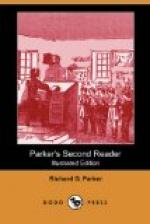5. “But let us not despond. The grace of our Lord is sufficient for us, and his strength is made perfect in our weakness. Let us knock again.
6. “Let us continue, with humble confidence, to do what we know to be pleasing in our Master’s sight. Let us work out our own salvation, with fear and trembling; for it is God that worketh in us both to will and to do of his good pleasure.”
7. We had now reached the gate of my father’s garden; and the good old gentleman, taking me kindly by the hand, bid me try to remember what he had said. He then went his way, and I saw him no more.
8. I afterward endeavored to find out who he was; but I did not succeed. His advice, however, sunk deep into my mind, and has often been of singular value to me since.
9. My disposition is naturally sanguine, and my disappointments proportionably acute. But, upon calling to mind the old mansion, the brass knocker, and my venerable counselor, I have frequently been led to knock again, when I might otherwise have sat down in despondency.
10. I hope that many of my readers will derive similar benefit from the perusal of this little history; for the sole end of its publication will be answered, if the young persons under whose eyes it may come be induced, at every season of doubt and perplexity, in the exercise of simple confidence in God, to knock again.
LESSON XXVIII
Make Good Use of your Time.—EMMA C. EMBURY.
[Illustration: “To everything there is a season, and a time for every purpose under heaven.”]
1. “My dear Anna,” said Mrs. Elmore, as she bade her little girl farewell, “I shall be absent ten days; and as you have already had so many lessons from me respecting the manner of distributing your hours of amusement and study, I will only say to you, now, ’Make good use of your time.’”
2. Anna’s eyes filled with tears as the carriage drove off, and she felt very lonely when she returned to the parlor without her mother. She thought over her mother’s parting words, until she felt quite proud of the confidence reposed in her, and resolved not to abuse it by neglect.
3. She accordingly took her books and sat down to her studies, as attentively as if her mother had been waiting to hear her recitation.
4. Anna was an affectionate, intelligent child. She would have made any sacrifices to please her mother, and she really loved her studies; but her one great fault was a disposition to loiter away time.
5. This her mother well knew; and after trying admonition, until she almost feared she was increasing the evil by allowing Anna to depend too much upon her guidance, she determined to test the effect of leaving her to her own responsibility.
6. For an hour after her mother’s departure, Anna sat in close attention to her studies. All at once, she started up. “I am so hungry,” said she, “I must go to Betty for some luncheon;—but stop—I will finish my exercise first.”




